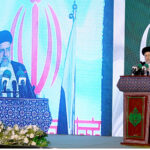CHICAGO, June 14 (APP): A book on the Sikh heritage in Pakistan has
been launched in Chicago, highlighting the legacy of the community that
was left behind following the partition.
The 500-page book “Lost Heritage, The Sikh Legacy of Pakistan”, by financial services executive-turned author Amardeep Singh, is his personal journey in search of his roots of origin.
Consul General Faisal Niaz Tirmizi was the keynote speaker at the launching ceremony of Singapore-based Amardeep Singh, who has also documented the rise and fall of the Sikh empire in Punjab (1799-1849) founded by Maharaja Ranjit Singh.
In doing so, Amardeep Sing had abandoned a lucrative banking career to visit 36 holy/historic sites in Pakistan.
Consul General Tirmizi said that the Sikh legacy in Pakistan was not only that of the Sikhs but was also the legacy of all citizens of Pakistan. He said although a very small portion of the population, the Sikh community is represented in all the walks of life in Pakistan. He further said that government of Pakistan is already facilitating Sikh Yatrees through swift visa processing and speedy custom and immigration clearance.
At the outset, Amardeep Singh expressed his gratitude to the government and the people of Pakistan for making his stay very comfortable and for opening their hearts and homes during his spiritual journey. He said that the Pakistani expatriates, living abroad, have welcomed his book very warmly as well. He specially appreciated the talk given by Ambassador Abdul Basit in New Delhi who greatly lauded his contributions in further cementing ties of Sikhs all across the world to the birth place of their religion.
On a suggestion from members of the audience to build world-class hotels around these facilities and to give more visas to Sikh Yatrees living in North America, Consul General Tirmizi said that these proposals would be conveyed to the Government of Pakistan. A few Sikh businessmen also suggested that the Sikh community could help raise funds for building world-class hotels around these facilities in a bid to attract the next generation of Sikhs from North America towards their religious sites.
Amardeep Singh also expressed his concern over the working of Pakistan-Sikh Gurdwara Prabandhak Committee and hoped that there would be more representation of Sikhs in it. He also expressed his concern that the Sikh section of the Lahore Museum has been closed down for three years, and urged the government to reopen it.




